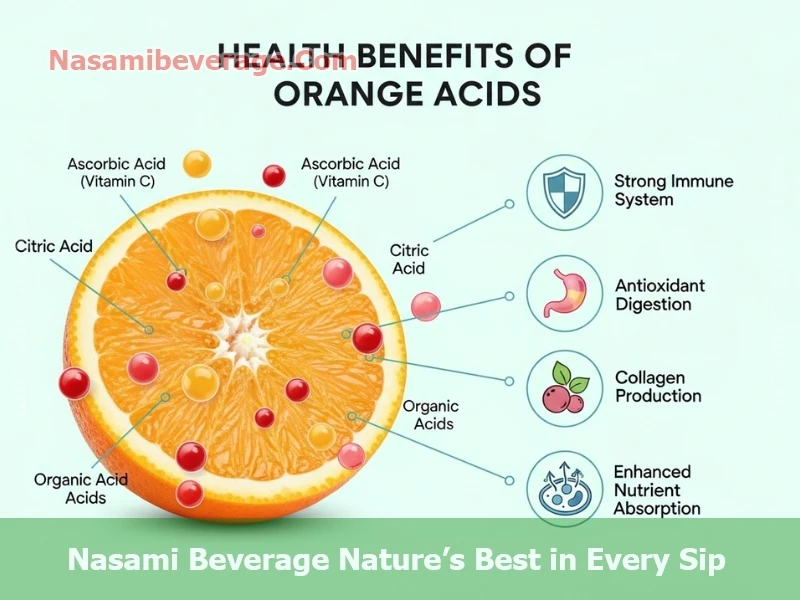Are you an orange lover, but sometimes hesitant because of that familiar tangy feeling? Do you wonder about the acids lurking within this bright citrus fruit and how they affect your health? You’re not alone! Many people enjoy oranges but are curious, or even concerned, about their acidity. This guide unravels the mystery of orange acids, revealing their benefits, potential downsides, and how to enjoy oranges without the burn. Get ready to decode citrus and make informed choices for your well-being.
The Tangy Truth About Oranges
A Brief Overview of Oranges and Acidity
Oranges are beloved worldwide for their vibrant flavor, refreshing juice, and impressive nutritional profile. They are packed with vitamin C, antioxidants, and essential nutrients.

However, that characteristic tang comes from the presence of acids, primarily citric acid. While these acids contribute to the delicious taste, they can also be a source of concern for some individuals, particularly those with acid reflux or sensitive teeth.
Why Understanding Orange Acids Matters
Understanding the types of acids in oranges, their effects on the body, and ways to mitigate potential discomfort is crucial for maximizing the enjoyment and benefits of this fruit.
This knowledge empowers you to make informed decisions about your orange consumption, ensuring you can savor their goodness without unwanted side effects.
Whether you’re a seasoned orange enthusiast or a curious newcomer, this guide will provide valuable insights into the world of orange acidity.
Citric Acid – The Star Player
What is Citric Acid and Where Does it Come From?
Citric acid is a naturally occurring organic acid found in various fruits and vegetables, but it’s particularly abundant in citrus fruits like lemons, limes, and, of course, oranges. Commercially, it’s often produced through the fermentation of sugar.
Citric acid is a weak organic acid, meaning it doesn’t fully dissociate into ions in water. This characteristic contributes to its tart but pleasant flavor profile.
The Role of Citric Acid in Orange Flavor
Citric acid is the dominant acid in oranges, responsible for the majority of their tangy and refreshing flavor. The concentration of citric acid varies depending on the orange variety, growing conditions, and ripeness.

Generally, oranges with a higher citric acid content will have a more pronounced tartness, while those with lower levels tend to be sweeter. Without citric acid, oranges would lack their characteristic zesty appeal.
While citric acid takes center stage, other acids play supporting roles in shaping the overall flavor and nutritional profile of oranges.
Malic Acid – A Subtle Sweetness
Malic acid is another organic acid found in oranges, although in significantly smaller quantities than citric acid. It contributes a subtle sweetness that complements the tartness of citric acid, creating a more balanced and complex flavor profile.
Malic acid is also found in apples and other fruits, lending a slightly different “green” tartness compared to citric acid’s bright tang.
Ascorbic Acid (Vitamin C) – The Health Booster
Ascorbic acid, more commonly known as Vitamin C, is an essential nutrient and a powerful antioxidant. While present in smaller amounts than citric acid, Vitamin C is a crucial component of oranges’ health benefits.
It contributes a slightly tart flavor and plays a vital role in immune system function, collagen production, and overall well-being. Choosing fresh oranges from brands like Florida’s Natural or Cuties ensures you’re getting the maximum Vitamin C benefits.
Health Benefits of Orange Acids
The acids in oranges, particularly citric acid and ascorbic acid, contribute to a range of health benefits.
Immune System Support – Vitamin C Power
Vitamin C is renowned for its immune-boosting properties. It helps stimulate the production and function of white blood cells, which are crucial for fighting off infections and illnesses.
Regularly consuming oranges can contribute to a stronger immune system and reduce the duration of colds and other respiratory infections.
Antioxidant Properties – Fighting Free Radicals
Both citric acid and Vitamin C act as antioxidants, helping to protect the body against damage from free radicals.

Free radicals are unstable molecules that can damage cells and contribute to chronic diseases like heart disease and cancer. Antioxidants neutralize free radicals, helping to maintain cellular health and reduce the risk of these diseases.
Skin Health – Collagen Production
Vitamin C is essential for collagen production, a protein that provides structure and elasticity to the skin. Adequate Vitamin C intake can help maintain healthy, youthful-looking skin by promoting collagen synthesis and protecting against sun damage.
Potential Downsides and Precautions
Despite their many benefits, the acids in oranges can pose some challenges for certain individuals.
Heartburn and Acid Reflux – The Orange Connection
For individuals prone to heartburn or acid reflux, the acidity of oranges can trigger or worsen symptoms. Citric acid can irritate the esophagus, leading to a burning sensation in the chest.
This is because the lower esophageal sphincter (LES), which prevents stomach acid from flowing back up into the esophagus, may be weakened or not functioning properly in people with acid reflux.
Brands like Tropicana and Minute Maid, while offering convenient orange juice options, can still trigger heartburn due to their acidity.
Tooth Enamel Erosion – A Long-Term Risk
The acidity of oranges can also contribute to tooth enamel erosion over time. Enamel is the hard outer layer of teeth that protects them from damage.

Frequent exposure to acidic foods and beverages can gradually wear away enamel, making teeth more susceptible to cavities and sensitivity.
Drug Interactions – Potential Considerations
While rare, the acids in oranges could potentially interact with certain medications. It’s always best to consult with your doctor or pharmacist if you’re taking any medications and have concerns about potential interactions with citrus fruits.
This is especially important if you take medications that are affected by stomach acidity, as the acids in oranges can temporarily lower stomach pH.
How to Enjoy Oranges Without the Burn
Fortunately, there are several strategies you can employ to enjoy the deliciousness of oranges without experiencing discomfort.
Choose Lower-Acid Varieties – Sweet Alternatives
Some orange varieties are naturally lower in acid than others. Navel oranges and mandarin oranges, like Cuties, tend to be sweeter and less acidic compared to varieties like Seville oranges, which are often used for marmalade. Experiment with different types to find the ones that best suit your tolerance.
Pair with Dairy – Neutralizing the Acid
Consuming oranges with dairy products, such as yogurt or cheese, can help neutralize the acid and reduce the likelihood of heartburn.
Dairy products contain calcium, which can bind to acids and buffer their effect. Consider pairing your orange segments with a cheese platter or enjoying a glass of milk alongside your orange juice.
Enjoy After a Meal – Slowing Down Digestion
Eating oranges after a meal can also help mitigate their acidic effects. When consumed on an empty stomach, the acid in oranges can irritate the stomach lining more easily.

Eating them after a meal slows down digestion and dilutes the acid, reducing the risk of discomfort. Simply Orange provides a convenient and refreshing post-meal option.
Moderation is Key – Finding Your Tolerance
Ultimately, moderation is key to enjoying oranges without negative side effects. Pay attention to how your body responds and adjust your intake accordingly.
Some people can tolerate a whole orange without any problems, while others may only be able to handle a few segments. Finding your personal tolerance level is crucial.
FAQ
Are oranges acidic or alkaline?
Oranges are acidic due to the presence of citric acid and other organic acids. However, they can have an alkalizing effect on the body after digestion.
Can I eat oranges if I have acid reflux?
It depends. Some people with acid reflux can tolerate oranges in moderation, while others may experience symptoms. Start with small amounts and see how your body reacts. Consider lower-acid orange varieties or pairing them with other foods.
What types of acids are found in oranges?
The primary acid in oranges is citric acid. Malic acid and ascorbic acid (vitamin C) are also present, but in smaller amounts.
How can I reduce the acidity of oranges?
You can’t directly reduce the acidity of the fruit itself. However, pairing oranges with dairy products, consuming them after a meal, or opting for sweeter varieties can help mitigate any potential negative effects.
Are orange peels acidic too?
Yes, orange peels contain acids as well, and the oils in the peel can sometimes contribute to heartburn in sensitive individuals.
Oranges are a delicious and nutritious fruit that can be enjoyed as part of a healthy diet. While their acidity can be a concern for some, understanding the types of acids they contain, their potential effects, and strategies for mitigating discomfort allows you to make informed choices and savor their goodness without the burn.
By choosing lower-acid varieties, pairing them with dairy, enjoying them after a meal, and practicing moderation, you can strike a balance between enjoying the benefits of oranges and minimizing any potential downsides.
Remember Hippocrates’ famous quote: “Let food be thy medicine and medicine be thy food.” Embrace the citrus balance and enjoy the tangy truth of oranges!


